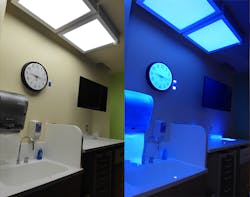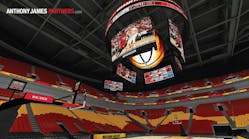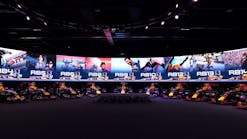LRC Evaluates Hybrid UV Lighting System to Reduce Healthcare-Associated Infections
People who visit hospitals are expecting care and treatment, not additional complications, yet approximately 1 in 25 patients contract healthcare-associated infections (HAIs) in U.S. hospitals, according to the Centers for Disease Control and Prevention (CDC). Standard cleaning procedures usually involve manual application of detergents and disinfectants. Unfortunately, the efficacy of these manual cleaning procedures can vary considerably. In fact, less than 50% of patient room surfaces are properly cleaned.
Given the rather poor effectiveness of manual cleaning, the Lighting Research Center (LRC) at Rensselaer Polytechnic Institute is investigating alternate, so-called, no-touch methods, including short-wavelength light, ranging from ultraviolet (UV) to blue light (200 nm to 410 nm). Short wavelengths can kill pathogens through a variety of pathways, depending upon the wavelength, the duration, and the amount. The expectation is that decontamination of room surfaces will improve when the human element is removed.
LRC researchers tested a new hybrid lighting system, developed by GE Current, a Daintree company, which was designed to provide both visible white light and disinfecting UV-A. The system was retrofitted into a modern hospital newborn intensive care unit (NICU) at the Memorial Beacon Children’s Hospital in South Bend, Indiana. The UV-A dosing was set to levels calculated to be safe for human occupation. Eight-hour exposures on counter surfaces were effective for suppressing pathogens identified by the CDC as highly problematic for healthcare facilities. LRC researchers also conducted a survey aimed at assessing the opinions of professional staff working in the NICU about the hybrid lighting system. Staff members accepted the hybrid lighting system, and the comments about the system were generally positive. An analysis of photodegrading effects suggested that UV-A resistant equipment and furnishing may need to be installed with this technology. The findings were recently published in Lighting Research & Technology.
“This lighting technology offers great promise in hospital applications,” said Jennifer Brons, Director of Design Demonstrations at the LRC. “We are currently planning future demonstrations in another hospital unit with greater bioburden.”
“Reducing healthcare-associated infections is critically important,” said LRC professor Dr. Mark Rea. “Unfortunately, the prevalence of these infections is only expected to rise. The present findings should form the foundation for the next generation of this technology.”
About the Lighting Research Center
The Lighting Research Center (LRC) at Rensselaer Polytechnic Institute is the world's leading center for lighting research and education. Established in 1988 by the New York State Energy Research and Development Authority (NYSERDA), the LRC conducts research in light and human health, transportation lighting and safety, solid-state lighting, energy efficiency, and plant health. LRC lighting scientists with multidisciplinary expertise in research, technology, design, and human factors, collaborate with a global network of leading manufacturers and government agencies, developing innovative lighting solutions for projects that range from the Boeing 787 Dreamliner to U.S. Navy submarines to hospital neonatal intensive-care units. In 1990, the LRC became the first university research center to offer graduate degrees in lighting and today, offers a M.S. in lighting and a Ph.D. to educate future leaders in lighting. Learn more at www.lrc.rpi.edu.
About Rensselaer Polytechnic Institute
Founded in 1824, Rensselaer Polytechnic Institute is America's first technological research university. Rensselaer encompasses five schools, 32 research centers, more than 145 academic programs, and a dynamic community made up of more than 7,900 students and more than 100,000 living alumni. Rensselaer faculty and alumni include more than 145 National Academy members, six members of the National Inventors Hall of Fame, six National Medal of Technology winners, five National Medal of Science winners, and a Nobel Prize winner in Physics. With nearly 200 years of experience advancing scientific and technological knowledge, Rensselaer remains focused on addressing global challenges with a spirit of ingenuity and collaboration.
Contact:
Rebekah Mullaney
Manager, Research Communications
Lighting Research Center
Rensselaer Polytechnic Institute
(518) 687-7100





